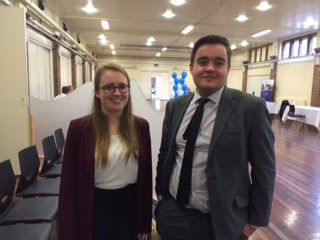Knowing that I am now inside the nice, warm and most of all dry fortress I call my house is one of life’s simplest pleasures.
But what happens when this fortress is always so cold?! Unfortunately, there will be problems with student housing in every city. Fortunately, there are people you can go to at the University of Southampton for help when you reach a point when you can no longer take indoor arctic conditions.
Every year, around March and April, a Sustainability fair is held on campus to promote green living in the student population.
Maxime working the Sustainability Fair.
HEAT audit student houses for energy consumption and give insulation all for FREE. The committee are also very keen to get volunteers so get in touch if you want some sustainability experience on your CV!
The Ethics and Environment team encourage SUSU to operate in a socially responsible and environmentally friendly way. They educate students and staff on relevant issues and campaigns and are responsible for representing the interests of Union members in the development of ethical and environmentally sound working practices and empowering members to take action to achieve this, both with regard to SUSU and the University.
The Home Energy Advice Team are looking to do as many student home visits as much as they can before Christmas break to save students up to £500+ a year (depending on the size of property, i.e. number of bedrooms). They provide the basic and removable material so there is no need for you to involve your letting agencies or landlords as everything can be removed when you move out at the end of the year.
So, what materials do HEAT provide?
Some landlords don’t care about how warm you are. Most of the time, their main priority is to get rent. It is up to you to heat up your new student home. Indeed, a lot of student house windows aren’t double glazed and thus become unbearably cold during the winter.
HEAT provides:
Reflective radiator panels. This is especially effective if your radiator is stuck to a wall facing the outside. It sticks to the wall using double sided sticky take so it is easily taken off and moved to your new student house the year after. All heat that stays at the back of radiator gets reflected back into the room as opposed to “seeping” outside.
Here’s to a nice and toasty home…(photo courtesy of the HEAT Facebook page)
Seasonal double glazing films. This is especially beneficial if you have single glazed windows. The film essentially provides another layer to you windows to prevent heat loss. As stated by the name, the films only last one season. After a year it un-sticks and is not as effective but the good thing about it is that because it isn’t permanent, it won’t damage the property one bit.
Energy saving light bulbs. These use less energy, are more efficient. An energy-saving recommended light bulb will cost you £3-£4 compared to about 50p for a normal bulb, but will put money back into your pocket by saving you around £9 on your annual electricity bill and up to £100 over its lifetime!
Draft proofing tape. This tape sticks onto doors. Like the letter box covers, these little sponges pretty much close the gaps that let draught in.
Who knew how much money you could save per year just by covering these gaps? (photos courtesy of the HEAT Facebook page)
Maxime is a third-year BSc Oceanography student who plans to work with businesses to reduce their carbon footprint and save energy. Coming from a Natural Sciences background, this is something he’s always been interested in, and the University has aided him with his sustainability work experience. If you’re ambitious, there are plenty of opportunities SUSU and its staff can provide for you – for example, Maxime is part of the Business, Ethics and Environment Programme (BEES).
I think all this talk about saving energy gives rise to the massive issue of climate change. The University is doing incredible research on sustainability science and fellow student blogger Emma has written about the recycling projects the University has undertaken.
Unfortunately most of us don’t see the effects of climate change first hand. Most of the changes are so variable and so incremental that a debate even exists on whether or not climate change is true!
But this is the truth: we don’t often make the link between turning off a tap and wars around the world. That’s because most of the negative effects of climate change are experienced by the global south – by poor and, mostly, developing countries.
Sustainability is a pertinent issue. I’m glad the University is investing a lot of mind power and funds into it!
Don’t forget to get in touch with the HEAT team if you are looking forward to going home to a nice, warm house. After all, 'Winter is coming'.
(Sorry, I couldn’t resist…!)
Rylyn










































